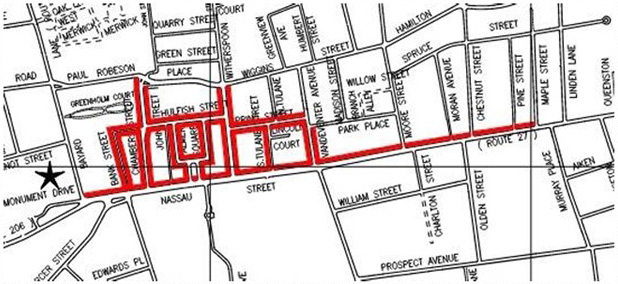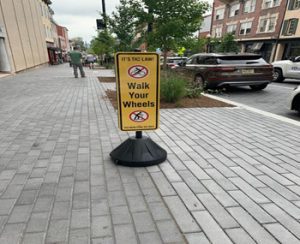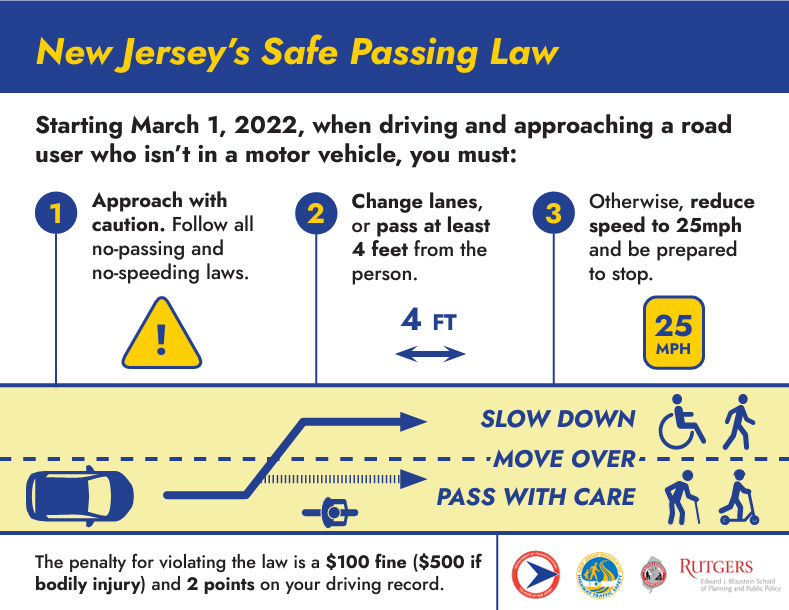Whether you are a resident, commuter, or visitor, Princeton has something to offer for everyone. As you enter the town and go past the wooden white welcome signs decorated with black lettering, you can feel the charming and rich history rooted in this quaint town. The downtown area is filled with various attractions like restaurants, cafes, stores, and of course, the prestigious Princeton University. Our goal is to make sure the roadways are safe for all including motorists, bicyclists, pedestrians, and all other vulnerable road users who wish to enjoy what Princeton has to offer.
If you find yourself in the downtown area known as the Central Business District, you need to know that Princeton has an ordinance that prohibits the use of bicycles, scooters, skateboards, and roller skates on sidewalks. In August 2023, Princeton launched the “Walk Your Wheels” campaign to help educate and bring awareness to this ordinance. The Central Business District has high pedestrian traffic, so the ordinance was put in place to protect both pedestrians on the sidewalks and those who wish to use bicycles, scooters, skateboards, or roller skates. If you do find yourself in the downtown area and are “walking your wheels,” please lock your bicycle or scooter at a designated location like a town provided bicycle rack. The ordinance was not meant to discourage those who wish to ride bicycles, scooters, skateboards, or use roller skates in the downtown area, but to allow pedestrians and those who travel by wheels to coexist without issues.

Over the past several years, and perhaps due to being a college town, there has been an increase in the usage of low-speed electric bicycles and low-speed electric scooters. Low-speed electric bicycles (both class 1 and class 2) and low-speed electric scooters do not require the operator to have a driver’s license, registration or insurance so these are desirable options for people who do not have a car or another mode of travel. Operators of both low-speed electric bicycles and low-speed electric scooters must follow the same laws, rules, and regulations applicable to bicycles so it is very important that operators are familiar with state and local laws. The use of low-speed electric bicycles and low-speed electric scooters are also prohibited on the sidewalks in the Central Business District. Effective January 25, 2024, Princeton University banned the storage, parking, use or charging of personal electric vehicles on and around campus. This includes electric scooters and other electric micro-mobility devices, such as hoverboards and electric or motorized skateboards.
 From January 2024 through the end of April 2024, the Princeton Police Department investigated four motor vehicle collisions involving bicyclists, and six motor vehicle collisions involving pedestrians. A majority of these collisions occurred in and around the Central Business District. Motor vehicle and pedestrian collisions have occurred at the following locations: South Harrison Street near Southern Way, North Harrison Street at Valley Road, Witherspoon Street near Nassau Street, Nassau Street at University Place, Washington Road near Ivy Lane, and one within the Princeton Shopping Center. Motor vehicle and bicyclist collisions have occurred at the following locations: Nassau Street near South Tulane Street, Riverside Drive at Princeton Kingston Road, Murray Place at Prospect Avenue, and Greenview Street at Wiggins Street. As I previously indicated, a majority of these collisions have happened in the downtown area where there is an abundance of vulnerable road users.
From January 2024 through the end of April 2024, the Princeton Police Department investigated four motor vehicle collisions involving bicyclists, and six motor vehicle collisions involving pedestrians. A majority of these collisions occurred in and around the Central Business District. Motor vehicle and pedestrian collisions have occurred at the following locations: South Harrison Street near Southern Way, North Harrison Street at Valley Road, Witherspoon Street near Nassau Street, Nassau Street at University Place, Washington Road near Ivy Lane, and one within the Princeton Shopping Center. Motor vehicle and bicyclist collisions have occurred at the following locations: Nassau Street near South Tulane Street, Riverside Drive at Princeton Kingston Road, Murray Place at Prospect Avenue, and Greenview Street at Wiggins Street. As I previously indicated, a majority of these collisions have happened in the downtown area where there is an abundance of vulnerable road users.
As we investigate collisions, our ultimate goal is to prevent crashes and save lives. The town of Princeton has already undertaken numerous measures to enhance the safety of all vulnerable road users, including providing bicyclists with a bicycle boulevard, designated bicycle lanes and paths, and placing shared lane markings or “sharrows” on the roadways to reinforce the legitimacy of bicycle traffic on the roadway. The town has also upgraded numerous intersections with new crosswalks and enhanced pedestrian safety measures, like pedestrian signals with audio prompts and rectangular rapid-flashing beacons. There have also been educational campaigns like “Walk Your Wheels” to help make our streets safer. Additionally, the Patrol Bureau and the Traffic Safety Bureau of the Princeton Police Department are provided with “Directed Enforcement Streets” each month for specific observation and enforcement. The “Directed Enforcement Streets” are meant to saturate an area for a specific violation like speeding, pedestrian crosswalk enforcement, use of a handheld cellular phone, etc. The ordinance prohibiting the use of bicycles, scooters, skateboards, and roller skates on the sidewalk in the Central Business District has been featured on “Directed Enforcement Streets” several times to help educate the public and gain compliance with the law.
 A recent change in law has also improved vulnerable road user safety. On March 1, 2022, New Jersey’s Safe Passing Law was amended to include vulnerable road users like pedestrians, bicyclists, scooters, or otherwise anyone not in a motor vehicle. The new amendment to the law requires operators of motor vehicles to approach a vulnerable road user with caution, move over a lane (if available) or pass at least 4 feet from the user, reduce speed to 25 mph or be prepared to stop until the driver can safely pass.
A recent change in law has also improved vulnerable road user safety. On March 1, 2022, New Jersey’s Safe Passing Law was amended to include vulnerable road users like pedestrians, bicyclists, scooters, or otherwise anyone not in a motor vehicle. The new amendment to the law requires operators of motor vehicles to approach a vulnerable road user with caution, move over a lane (if available) or pass at least 4 feet from the user, reduce speed to 25 mph or be prepared to stop until the driver can safely pass.
I would be remiss not to mention my perspective from the vantage point of the Traffic Safety Bureau: lack of education in laws, rules and ordinances is a major traffic issue, along with distracted driving. When a person wants to obtain a driver’s license, they must first pass written, vision, and road tests. They are required to have an entire year of supervised driving under their driver’s permit. This is to ensure the driver is well-prepared to drive along roadways. There are no written tests, vision tests, or road courses to pass in order to drive a bicycle, scooter, low-speed bicycle, low-speed scooter, or being a pedestrian. This provides some operators of those modes of travel a false feeling that laws are not applicable to them. In order for traffic to flow as intended and to ensure safety, all motorists and vulnerable road users need to make conscientious efforts to not only obey the traffic laws, but to be courteous and respectful to fellow road users.

Sgt. Michael Strobel is in his 15th year with the Princeton Police Department, and oversees the Traffic Safety Bureau. In his 5th year of Traffic Safety, he has also served in the Patrol Bureau and Detective Bureau. He has numerous certifications in the field of Traffic Safety to include being an accident reconstructionist.
